

AI for workflow automation: Full guide for 2025
Workflow efficiency is a crucial factor in any enterprise’s success. Companies are constantly seeking new ways to simplify and boost work processes for improved productivity and better business outcomes. AI workflow automation software is the solution that makes a real difference in convenience and results, eliminating routine tasks and offering more flexibility for the company’s staff.
Let’s examine workflow automation software and the technological advancements we can implement and leverage today.
Want to automate processes? Check out our RPA expertise.
What is AI workflow automation?
Above anything else, AI automation technology replaces manual work across a wide range of time-consuming tasks.
Traditional automation mainly relies on strictly defined rules. Alternatively, AI workflow automation leverages machine learning and natural language processing to become better, more personalized, and fit for more complex tasks over time. Artificial intelligence provides the ultimate flexibility, dynamics, and adaptivity to changing requests, shaping a reliable and continuously improving workflow.
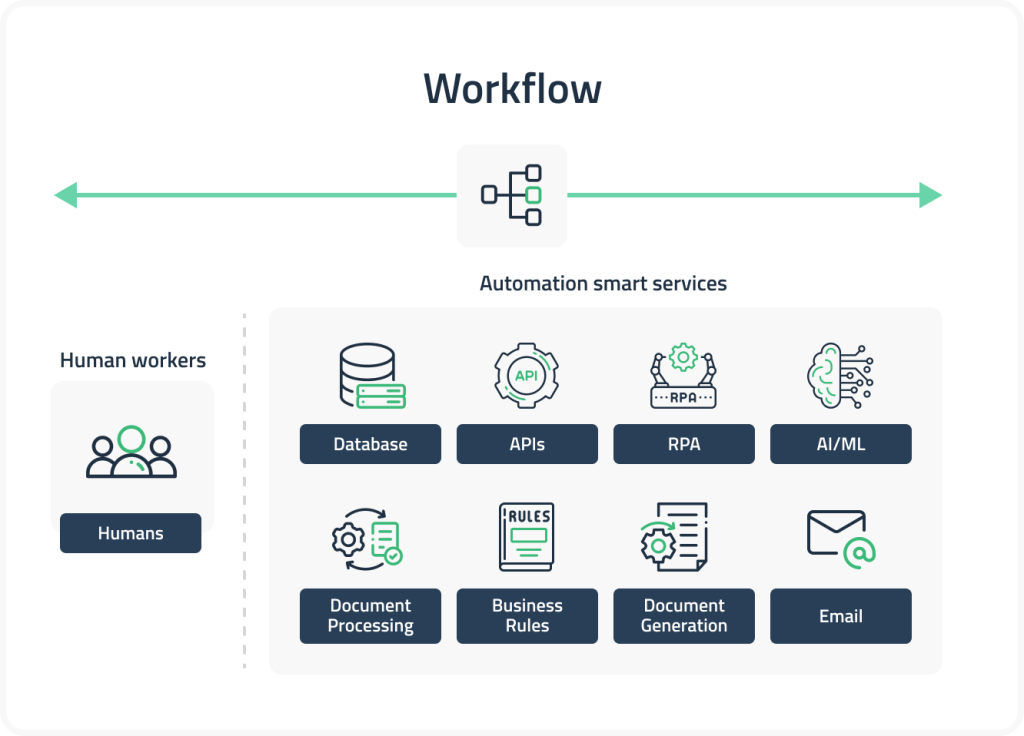
Statista’s global research on worldwide market automation shows that approximately 58% (i.e., the majority) of today’s marketers choose automation for email marketing. 49% consider automation a necessary tool for social media management. This vividly demonstrates the readiness of the market to delegate repetitive processes to AI and experience the advantages of the digital era powered by AI on all sides.
The reasons for such growing AI engagement in workflow processes are pretty simple and to the point — let’s summarize:
- AI provides ways to eliminate manual, repetitive tasks that waste time, which you could use in more productive directions.
- Helpful, personalized AI integrations make teams more effective and focused on complex procedures instead of senseless routines.
- Even with the most careful human workers, there is still a chance of human-factor mistakes in routine processes.
- AI offers advanced ways to optimize workflows and cover bigger project scales within the same time limits.
- Intelligent automation is equally helpful for giant and small enterprises.
- AI’s intelligent automation may also help revitalize and upgrade customer support, sales, and marketing departments.
- ML-based AI models can perform generative, analytics, security, and advanced search functions, saving time and costs.
Benefits of workflow automation with AI
AI automation creates a basis for deep workflow transformation by replacing traditional processes with autonomous, fast, and highly accurate AI solutions. What specific advantages can artificial intelligence provide for modern enterprises?
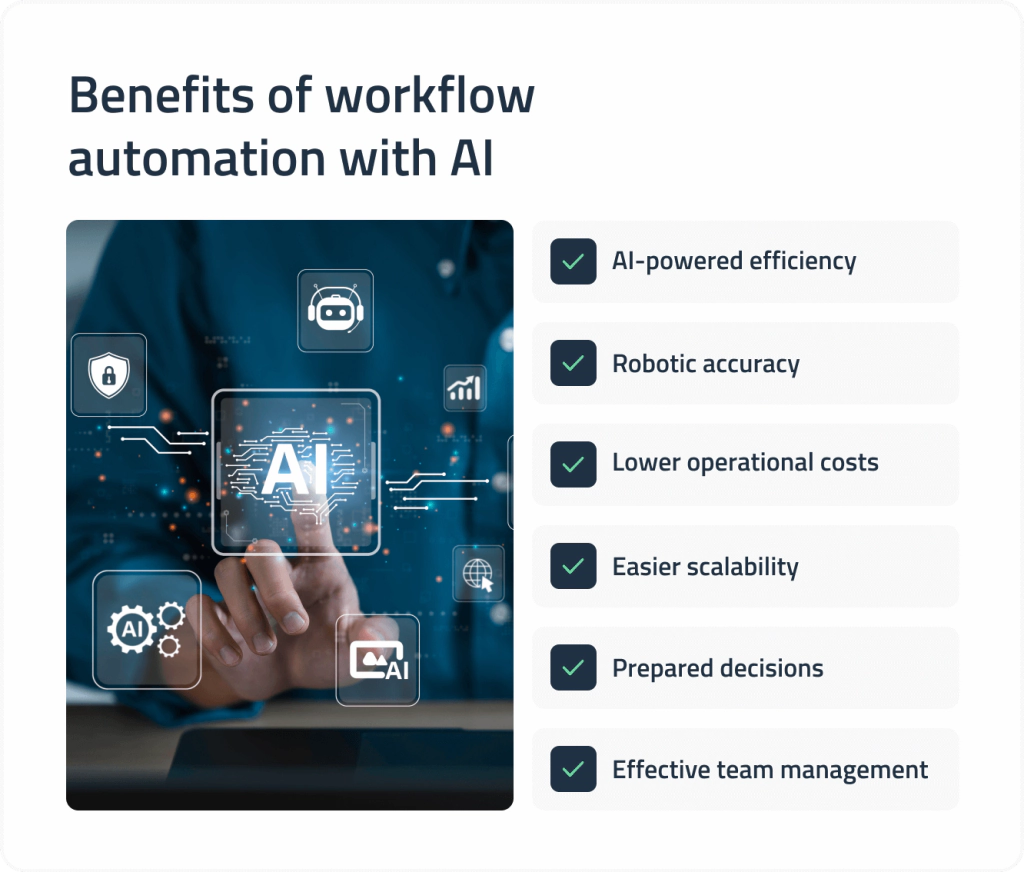
- AI-powered efficiency. Process streamlining and data handling are the first priorities when discussing improved efficiency. Artificial intelligence can handle large data volumes without any quality reduction. It speeds up essential workflow procedures by mimicking human behavior and performing operator functions to cover more tasks.
- Robotic accuracy. Human errors are a common cause of delays and mistakes, but AI does not have such an issue. Performance precision is regulated by advanced algorithms based on the training data. AI provides more reliable assistance in areas such as reporting and data entry.
- Lower operational costs. By automating routine parts of work, you can streamline many processes and achieve more strategy-efficient resource allocation. AI automation lowers the costs invested in manual labor risk management and coverage of error and inefficiency issues.
- Easier scalability. The company’s scaling leads to increased resource demands and proportionally growing volumes of work. Human teams would need more members to cover new tasks, but artificial intelligence can adapt to changing environments and growing requests without compromising performance.
- Prepared decisions. AI deeply studies data insights with the help of data and predictive analytics to provide more accurate, data-driven reports. Having all the information about possible trends, potential issues or customer’s points of interest helps make more data-oriented strategic decisions.
- Enhanced risk management. AI can monitor and check any incompliance with global regulations or standards. AI-powered tools can flag anomalies and ensure that all processes flow according to the provided guidelines. Automated risk control can easily help mitigate possible risks.
- Effective team management. Artificial intelligence can improve collaboration by integrating a wide range of tools and platforms for quick and productive communication within the team. It can help to stay in touch with all team members and provide updates, reports, and insights across teams on time.
Related article: AI for data engineering: Use cases and key benefits
Types of AI workflow automation
AI workflow automation can be divided into several types and related efforts. Each focuses on specific aspects of automation and process optimization. Let’s examine the most relevant and business-valuable automation types.
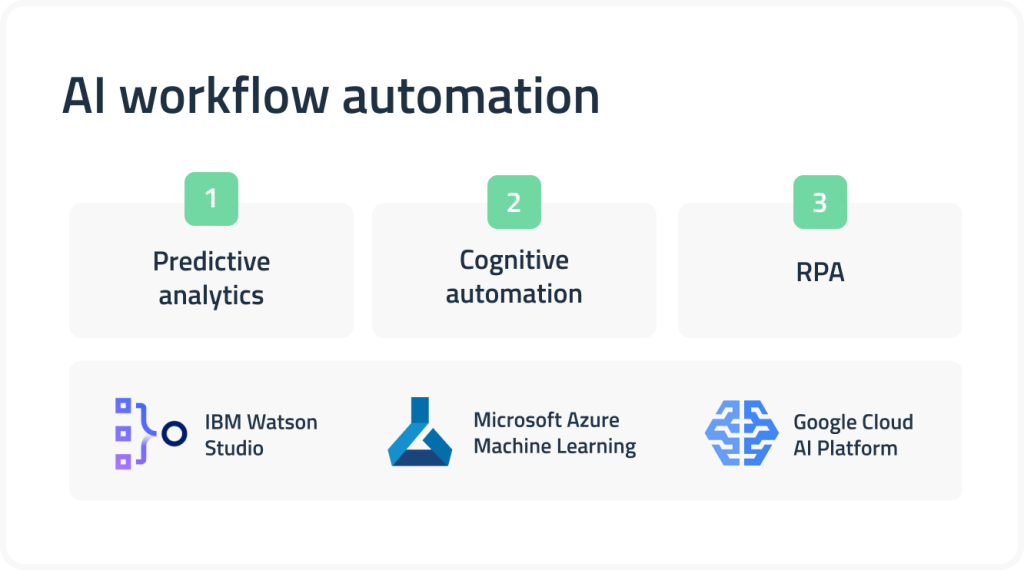
AI automation with the help of predictive analytics
Predictive analytics is a powerful combination of artificial intelligence with machine learning techniques. This technology is used for future outcomes forecasts. Reading into historical data as a base, it analyzes datasets, searching for patterns and correlations. Analyzed data helps to form predictions on future trends and behaviors. Analytics tools are often employed to tailor future campaigns to customer needs and expectations. For instance, they can provide accurate forecasts on future stock prices and possible credit risk in the finance sector.
Examples of tools:
- IBM Watson Studio
- Google Cloud AI Platform
- Microsoft Azure’s Machine Learning
- SAS Advanced Analytics
- AIOps tools
DICEUS is an official Google Cloud Partner. Contact us for professional consulting on Google Cloud projects.
Cognitive automation
The main difference of this automation type is its ability to mimic the human way of thinking. Cognitive-type models leverage natural language processing, machine learning, and other AI abilities. The goal of such a model is to create a high-quality imitation of human cognitive processes, including understanding, reasoning, and decision-making. A cognitive model utilizes NLP to understand and interpret human language and data formations. Such AI models continuously learn to achieve better performance with the help of new data or interactions.
Examples of tools:
- IBM Watson Assistant
- Google Dialogflow
- Microsoft Azure’s Cognitive Services
- UiPath AI Center
RPA
RPA or robotic process automation is also known as rules-based automation. An AI model of this type operates according to predefined rules and workflows. It doesn’t need new data for continuous learning. It uses specifically provided instructions for storing, sorting, transforming, and other data manipulations. RPA is often used for data entry and form processing as a simple, but effective way to automate repetitive processing tasks.
Examples of tools:
- UiPath
- Automation Anywhere
- Blue Prism
- Kofax RPA
Each AI automation software type has its advantages, so there is no all-purpose option. You must select the automation type that matches your requirements and automation purposes the most. At DICEUS, we will be glad to help you find the most profitable and all-covering solution.
Use cases for AI workflow automation
Implementing AI workflow automation is a popular decision for many industries due to the wide range of its spheres of use. Here you can see the most well-known use cases.
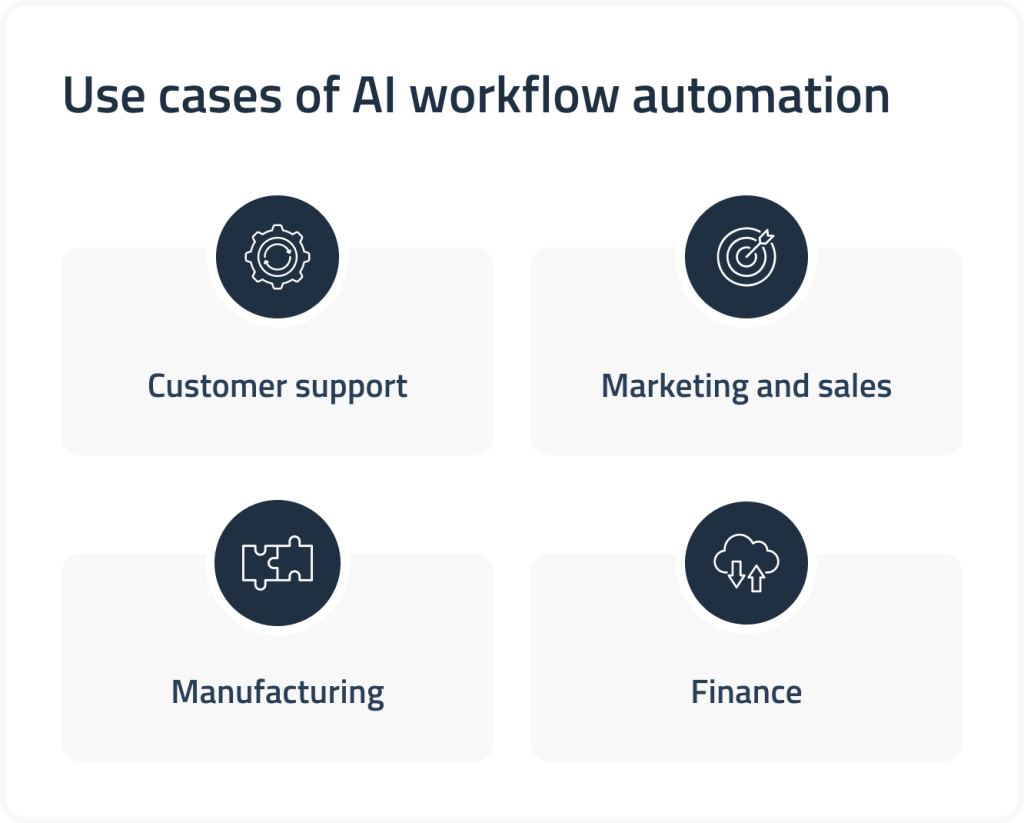
Customer support
Virtual assistants are among the most widely used options for AI workflow automation. Chatbots are used to reduce the routine workflow for human workers in customer support areas and improve general response time. Customers can get automated responses to the most common issues. Meanwhile, more complex inquiries can be sent to human operators for further processing. Additionally, an AI model can be instructed to collect feedback for analysis and service improvements.
Learn more about our Vitaminise Chatbot for insurance
Marketing and sales
AI-powered workflow automation can be used to evaluate and prioritize leads. It can help focus on high-potential opportunities. Marketing teams can boost conversion rates and improve clients’ interest by providing targeted campaigns. AI can automatically analyze customer interaction and deliver personalized offers, recommendations, and engaging content. AI-powered automation tools can help to estimate and manage stock levels, reducing the chance of overstock or stockouts.
Manufacturing
Depending on where you will apply workflow automation, AI can monitor quality control, analyze products, and predict their possible maintenance requirements. Predictive maintenance can reduce downtime and avoid spending costs on breakdowns. Analytic tools can forecast future market demands, help manage inventory, and optimize supply chains.
Finance
The financial sector nowadays prefers to automate a significant part of former manual work. Automated reporting systems help you stay informed about the situation in the financial market. They assist in studying and optimizing strategies for future investments. Companies tend to invest in automated fraud detection systems. Such security measures keep any behavior anomalies in check and lower the risk rate for their institution. Automated systems are used as a powerful protection from illegal transactions.
Top challenges of AI-powered workflow integration
Arming up for the challenges you may face during AI integration into the workflow process, we would recommend considering the following points before everything else:
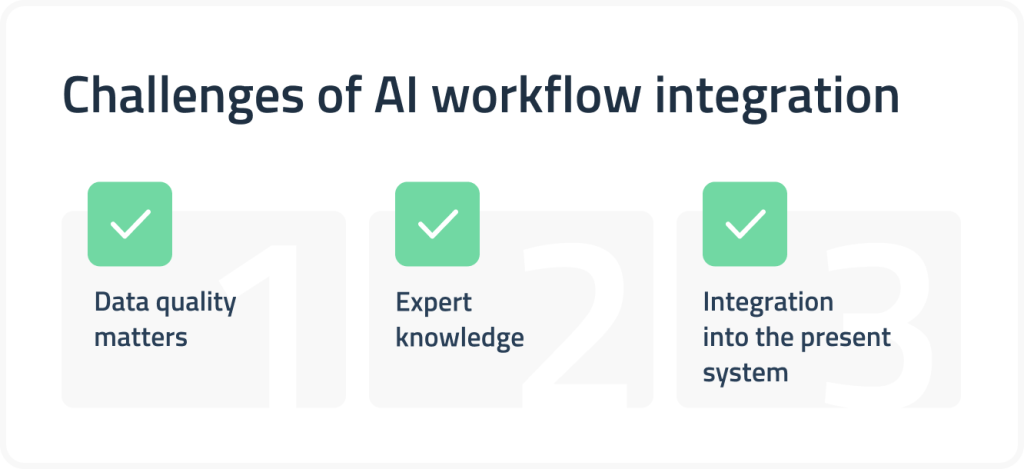
- Data quality matters. Data serves as a base for future AI-powered workflow: the better you feed your AI model, the better results you will achieve. Apply data management strategy to prepare your data for future integration. Make sure that all information is complete, not biased, and covers various scenario types. Data corruption may seriously affect algorithms and cause issues for integration and future operations.
Expert knowledge. When implementing AI workflow automation you can’t just rely on anyone. It would be best to collaborate with professional data scientists and developers with rich knowledge of artificial intelligence and automated systems. DICEUS experts are more than familiar with the tech stack. We have a long history of successful smart integration cases, and we will be glad to boost your existing systems with AI power. - Integration into the present system. In many cases, workflow automation is an upgrade of the existing system to a new level, which may entail two issues: 1) you need to choose an AI solution that will be compatible with your company’s software; 2) you will need to train your staff to operate with a new system.
Collaboration with tried-and-tested experts is the only way to gain a guarantee of getting proper solutions. And extra staff training will help with faster adaptation to the changes.
Experiencing a lack of technical expertise and skills?
Connect with a professional team to address your project challenges.
DICEUS expertise with AI in workflow automation
DICEUS has been working on various projects focused on AI workflow automation, and we would like to share some of them with you.
RPA for cash transactions
We have been working on automation for cash transactions for a major Ukrainian bank. Robotic process automation allows banking systems to analyze transactions within bank branches. Such an approach helps improve security management and enhance protection from suspicious transactions. This upgrade helps to define if the real customer sends the request or if it’s an attempt to take illegal action. The workflow automation boosts monthly operations and enhances their efficiency, at the same time minimizing cash withdrawal manipulations.
Automated subscription management and improved functionality
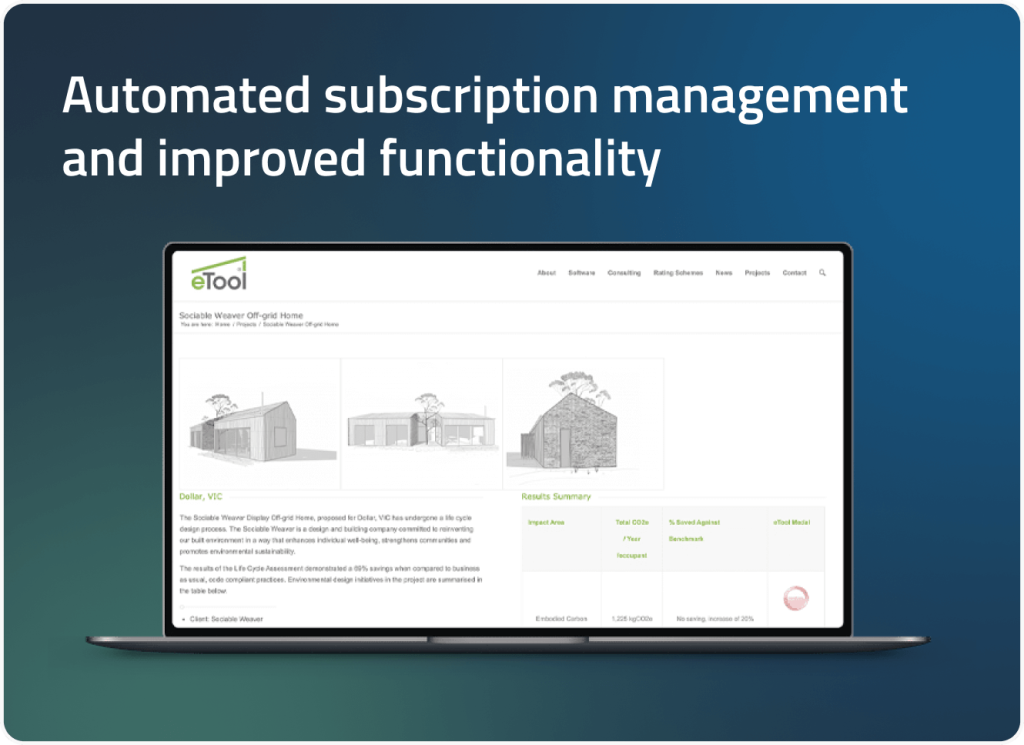
eTools is a software with over 3,000 users based on a SaaS model. Much of the work was processed manually and our customer wanted to upgrade the system with automated workflow. The goal of the eTools project was to replace the manual processes with automated subscription ones. Also, our client wanted to enhance the management system. We built a connection between software and CheddarGetter API, automated processes, and provided new enterprise and payment functionalities by adding 33 new modules. This upgrade reduced manual work by 80%, handling billions of visitors annually without effort.
RPA for reports

Working with the bank from Saudi Arabia, we faced a mission to integrate the RPA system for advanced report processing. We developed a system that can search debtors within the bank database. It can generate reports and send them to executives for further processing. We excluded the possibility of error and made the workflow more efficient. The automated system protects the bank from potential penalties by processing all the notifications within one working day. As a result, the bank managed to allocate resources more effectively and reduce costs on human employees.
RPA for anti-money laundering
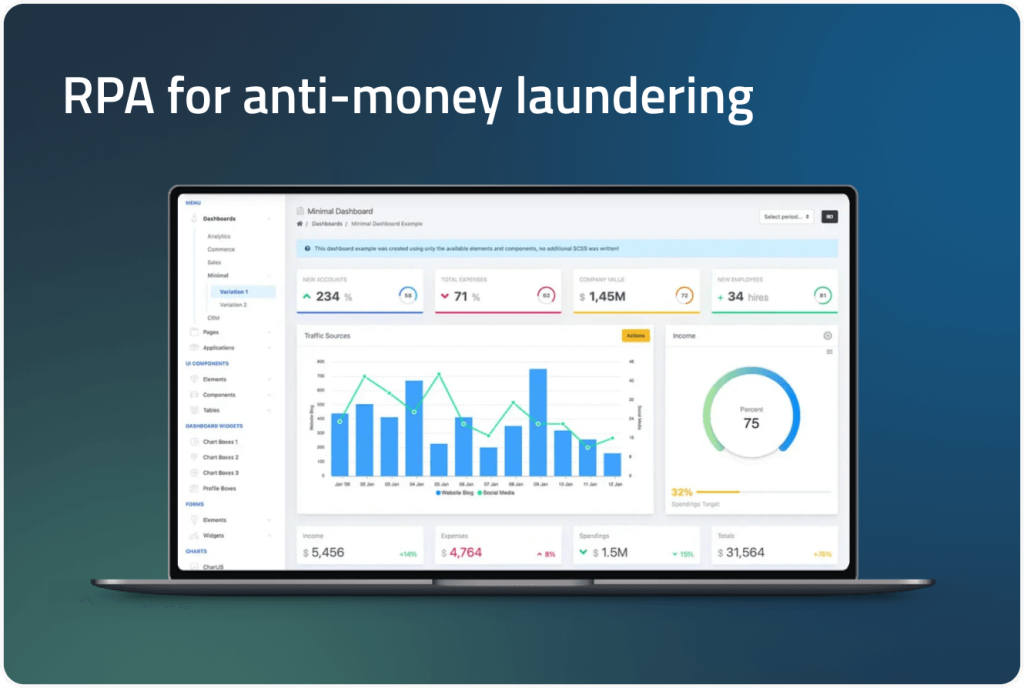
Our project for a German bank is one more example of automation as a security improvement. We aimed to develop a robotic process automation system to monitor bank transactions. It aimed to detect suspicious behavior and potential fraud and help staff shut down illegal money manipulations. Our AI RPA module checks the client’s information and verifies it. The system works round-the-clock and significantly reduces both manual operations and error rates. It saves time for human operators and speeds up the search procedures during verification.
Conclusion
The decision to implement AI workflow automation is the first step to innovative business solutions. It can significantly transform your enterprise’s workflow. Automation can greatly impact workflow efficiency and accuracy by replacing inconvenient manual processes with time-saving options. It can also become a powerful upgrade and addition to your marketing strategies and business analytics.
By choosing the required automation type you can find a solution that will cover a significant part of procedures. Even more: it will enhance both the staff and customers’ experience, making the work faster with less effort. The AI workflow automation not only fulfills your business goals but also improves your position on the competitive edge.
Frequently asked questions
What is artificial intelligence workflow automation?
Artificial intelligence workflow automation is the process that allows AI to cover traditionally manual procedures with automated ones. The main goal of AI automation is to free human workers from routine tasks and improve the whole company’s productivity and efficiency. The AI can serve to enter, analyze, and process various data according to the provided instructions. It can help to improve customer experience with prompt responses, personalized approaches, and targeted marketing offers.
What are the most popular use cases for AI workflow automation?
AI automation is used most of all for customer support service interactions, data processing, enhanced data protection, manufacturing, marketing, and finance. Thanks to its ability to mimic human-like reactions and generate conversations it can become a powerful virtual assistant in most of general issues. Predictive analytics and accurate forecasting in combination with preference analysis help to tailor successful marketing campaigns. It also helps provide relevant content in the company’s social networks.
What are the advantages of AI workflow automation?
AI workflow automation opens a wide range of opportunities for the company such as cost-saving, better productivity, advanced team communication, data-driven decision-making, and stronger security measures. It could offer a special set of functions to each industry to cover its main business goals. Automation can also reduce human effort in any industry sector. AI workflow automation increases the amount of monthly operations and improves the rate of satisfied customers.
How to properly manage challenges while implementing AI-based workflows?
Prepare high-quality data to form an accurate and comprehensive dataset for AI learning. Collaborate with experts in the field to choose and develop solutions that will work specifically for your business goals. Offer training for staff to adapt to the changed system faster. Show them the benefits of the new workflow, and involve employees in the transition process. Monitor the system to ensure it works properly and check if any updates are required for further workflow improvements.





